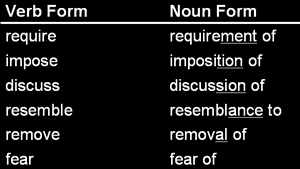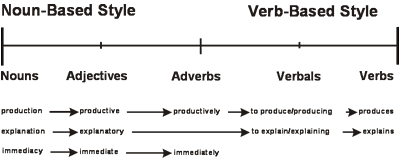In the previous section on clarity, we pointed out that eliminating strings of prepositional phrases often involves turning nouns into verbs or verbal forms. Some of the examples we presented involved changing the completion of to complete, the reassignment of to reassigning, and the rewarding of to rewarding. In each case, we created a more verbal style by eliminating unnecessary nominalizations. A nominalization is the noun form of a word that also has a verb form. For example, completion and reassignment are nouns corresponding to the verbs complete and reassign. The following diagram illustrates the pattern for verbal style.

Overuse of nominalizations is widespread in technical writing, affecting both clarity and conciseness. But note that the noun forms of verbs are also very useful for communicating abstract concepts. While you cannot eliminate nominalizations, you should limit their use.
The following intentionally exaggerated example compares the differences between texts written in the noun-based and verb-based styles.* The noun forms in the noun-based example and corresponding verb forms in the verb-based example are highlighted in red.
Everything today has the requirement of the conformity of people to some standard. There is the requirement to be similar in their speech and in their beliefs. If you have different ideas, people have the thought you are odd. Our fear stops the expression of our thoughts about our surroundings. We must have a resemblance to our neighbours or friends. Because there is so little we can do to be individuals, it is my thought that we would commit an error by the imposition of a dress standard on students. It would be a loss to their expression of individuality.
(100 words)
Everything today requires people conform to some standard. Similarity is required in how they speak and what they believe. If your ideas differ, people think you are odd. We fear expressing
what we think about our surroundings. We must resemble our neighbours or friends. Because there is so little we can do to be individuals, I think we would err by imposing a dress standard on students. They would lose a way to express individuality.(75 words)
Note that the revised version cuts 25 percent of the words without eliminating content. Also note that some of the nominalizations in the above example are preceded by an article (a, an, the) and followed by a preposition (typically, of.)
*Adapted from R. L. Hake & J. M. Williams, "Style and Its Consequences," College English, 43, 1981, 448-449. Used with permission.
Developing a verbal style is not just a matter of revising for nominalizations, but of revising to move from a reliance on nouns and adjectives toward a reliance on verbs, verbals, and adverbs. Think of this move in terms of a continuum with nouns at one end and verbs at the other, as presented in the following figure.

- Look for the articles and prepositions that accompany nouns (especially of).
- Transform nouns to verbs wherever possible.
- Avoid combining a noun-based style, heavy use of prepositions, and the passive voice because this particular combination is very difficult for readers.